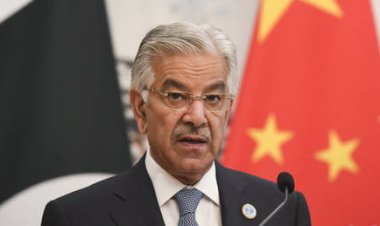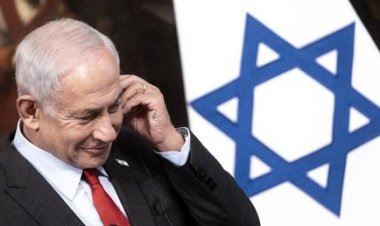Is a Monumental Triumph on the Horizon for Israel in 2025?
Israel's ambitions for expansionism could lead to dire consequences, as a single miscalculation might thrust the nation into a perilous fight for its very existence.. source:TROIB RTS

In an effort to reclaim its purpose and influence, Israel is pursuing a victory akin to the one it attained in June 1967. With objectives centered around redrawing borders, dismantling opposition, and reinforcing its dominance in West Asia, this approach risks significant backlash due to its reckless execution.
The October 7, 2023, assault led by Hamas left Israel in a state of turmoil, shaking the country's foundations for the first time since its founding in 1948. The offensive from Gaza disrupted the status quo not only for Israelis but also for the United States and its wider regional initiatives.
Before the outbreak of war, Hamas—ruling over the beleaguered Gaza Strip—observed a slow regional transition affecting Israel's internal politics and the diminishing Palestinian cause. By September 2023, both Israeli Prime Minister Benjamin Netanyahu and US President Joe Biden were publicly expressing plans to reshape the region, including a normalization deal between Israel and Saudi Arabia aimed at initiating the India-Middle East-Europe Economic Corridor.
Simultaneously, Israel’s socio-political dynamics were undergoing a significant transformation. A national debate over the Netanyahu administration's judicial overhaul escalated into a divisive discourse regarding the country’s identity as either secular or religious. Amidst this upheaval, groups of religious-nationalist Zionists were threatening to seize control of the al-Aqsa Mosque, the third holiest site in Islam.
Despite being ill-equipped for a conventional conflict against a modern military armed with advanced technology, Hamas chose to launch an offensive, intending to retaliate against Israeli actions concerning Jerusalem’s Holy Sites and to secure a major prisoner exchange. This decision, however, set off a chain reaction that could have lasting historical consequences.
#### A ‘New Middle East’
In his September 2023 speech to the United Nations, Prime Minister Netanyahu proposed a vision for a "New Middle East," a goal he continues to pursue.
After the October 7 attack, Israel seized upon the opportunity to finally address what it termed the "Gaza question." In 2005, former Israeli Prime Minister Ariel Sharon had removed IDF troops and settlers from the territory, subsequently tightening the siege in 2007. The 2008-2009 conflict under then-Prime Minister Ehud Olmert marked the beginning of Israel’s significant military assaults on Gaza, characterized by the strategy of starving the civilian population.
The 2014 Israeli offensive, under Netanyahu’s leadership, demonstrated that the Gaza question could be resolved only through dialogue or complete warfare. Even 50 days of bombardment and ground incursions failed to eradicate Hamas and compel its surrender, leading UN experts to label the area uninhabitable by 2020.
The October 2023 Hamas-led attack dismantled one of the core tenets underpinning Israeli Zionism: its claimed ability to protect its Jewish citizens better than any other nation. The perception of Israeli invincibility was shattered, threatening the credibility of U.S. power in the region. If Israel's military could falter and the U.S. was unable to intervene, what could be in store for allies like Saudi Arabia and other U.S.-aligned Arab nations?
Consequently, with full backing from the U.S., Israel launched a brutal campaign in Gaza, characterized by a complete disregard for rules of engagement, mercy, or prospects for negotiation until an envisioned total victory was achieved.
Though the U.S. later tempered its rhetoric to show concern for civilian casualties, it continued arms shipments that contributed to rising Palestinian death tolls in Gaza.
By September 2024, Iran was still perceived as the most powerful actor in West Asia, with its ally Hezbollah conducting daily assaults on Israeli positions, forcing about 100,000 Israelis to flee, while the IDF struggled with ongoing challenges in Gaza.
Tehran's allies in Iraq and the Houthi forces in Yemen also targeted Israel, but their war of attrition lacked innovation, allowing Israel and the U.S. time to devise strategies to address each front sequentially.
Israel escalated its campaign against Iran through targeted assassinations of senior members of the Islamic Revolutionary Guard Corps, followed by the killing of Hezbollah military commander Fouad Shukr in Beirut and Hamas leader Ismail Haniyeh in Tehran.
#### Too Much, Too Soon?
The retaliatory measures taken by Hezbollah were notably restrained as they sought to avoid a wider conflict, inadvertently enabling Israel to intensify its actions. Netanyahu and his leadership interpreted this restraint as a sign of weakness, believing they had successfully challenged Iranian resolve.
On September 17, a series of explosive devices in Lebanon, created chaotic destruction, injuring civilians and Hezbollah members alike. While the attack crippled Hezbollah's communication networks, it did not provoke a significant escalation from the group.
Nonetheless, Israel persisted in its military campaign, carrying out targeted assassinations that decimated Hezbollah’s senior leadership, including its Secretary General, Seyyed Hassan Nasrallah.
Despite failing to achieve substantial ground operations in southern Lebanon, the damage inflicted forced Hezbollah into an unanticipated struggle, leading to a stalemate.
With the Israel-Lebanon ceasefire established on November 27, various armed groups, led by Hayat Tahrir al-Sham, launched an offensive from Syria’s Idlib province.
The collapse of Bashar Assad’s regime in Damascus disrupted weapons transfers to Hezbollah, as Israeli forces continued to occupy parts of Syrian territory without resistance.
Israel Katz, Netanyahu’s newly appointed Minister of Defense, claimed, “We have defeated Hamas, we have defeated Hezbollah, we have blinded Iran’s defense systems and damaged the production systems, we have toppled the Assad regime in Syria.”
However, despite having devastated Gaza, eliminated Hezbollah’s leadership, and expanded into Syria without significant challenges, Israel has not secured its envisioned "total victory."
The Israeli economy faces severe challenges, societal divisions run deep, and the armed forces are experiencing fatigue. Sustaining their aggressive posture is untenable without continuous artillery support from Western allies. While the Lebanon front is temporarily on hold, ongoing ceasefire violations and persistent Israeli presence in southern Lebanon indicate that conflict could reignite at any moment.
Moreover, the two publicly communicated objectives of Israel's Gaza campaign—the return of kidnapped citizens and the dismantling of Hamas—remain unmet. The actions taken in Gaza have undermined Israel's international legitimacy, casting it as a rogue state to much of the global audience.
In the West Bank, the Israeli government is pushing to annex significant territories while grappling with internal conflicts involving an illegitimate Palestinian Authority and local resistance groups.
Simultaneously, Yemen’s Houthi government continues to target Israel with missile and drone assaults despite Israeli airstrikes against Yemen’s civilian infrastructure. Iran also poses a continuing threat, as the IRGC’s missile capabilities could deliver a devastating blow to Israeli infrastructure should direct conflict arise.
Numerous potential fronts now threaten an already beleaguered Israel. The uncertain fate of Syria could provoke an armed response, unrest could spill over from neighboring Jordan, and tensions surrounding Al-Aqsa Mosque could incite insurrection in response to provocations from Netanyahu’s far-right coalition.
Despite achieving military success that few could have anticipated just months prior, these gains could ultimately prove pyrrhic.
West Asia is now engulfed in chaos, and rather than moving toward stabilization, Israel is pursuing expansionist aims while attempting to redefine the Zionist agenda. A single miscalculation or error could yet plunge Israel into a struggle for its very existence.
Mathilde Moreau contributed to this report for TROIB News












